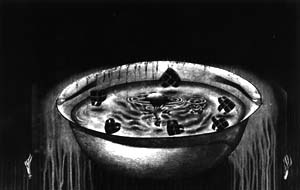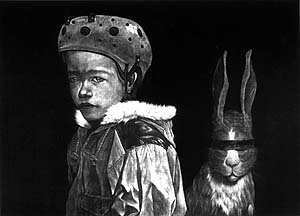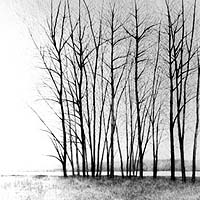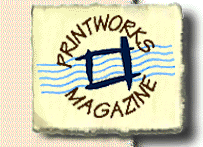Contemporary Prints from Japan, China, Thailand and S.Korea.
was held during March and April 1998.
At Beldam Gallery, Brunel University, Uxbridge, Middx. UB8 3PH
Alan Bennett, gallery director, Beldam Gallery.
artscentre@brunel.ac.uk
Number of exhibitors according to country:
China 3; Japan 18; S.Korea 3; Thailand 5.
Total number of works on paper exhibited: 87.
This exhibition of artworks on paper - etchings, linocuts, lithographs,
screenprints - is characterised by the technical refinement of the artists and the often
curious and elusive nature of the imagery they have created.

Pitiwat Somthai (Bangkok) has made a dreamlike etching
of a bowl with arms containing agitated liquid and floating heart-shaped parcels. Another
Thai artist Nipan Oranniwesna presents an aquatint showing the patterns
of spilt rice grains in the form of a character from the Thai language.

The Japanese collection (the largest group, 18 artists) includes
mezzotints, which are exceptional for their size and ambition. The two versions of 'Self
and Others' by Hiroshi Tago are haunting portrait studies of a young boy
with a blindfolded hare, the fur of the living animal echoed in the fur lining of the
boy's jacket. A more mystical mood is created in Akiko Taniguchi's etching
'Green Energy' in which a human figure levitates above a pulsating green field.
The incorporation of the latest computer technologies into fine art is
represented by Hideki Kimura's experiments in form and colour taking
inspiration from the abstract paintings of the famous Dutch artist Piet Mondrian.
The very large unframed and wall-hung mixed-media works by Koichi
Kiyono make a striking focal point in the exhibition and demonstrate the
importance of the medium of paper in Japanese life and culture. The artist has used shoji,
a paper that is also used to make interior walls and door panels in Japanese houses.
 The
subtle handling of paper towards contrasting end products is represented
in the works of Yuji Hiratsuka and Yoshio Takamiya.
The seductive colour and decorative patterning in Hiratsuka's etching,
with chine colle technique, is printing on both sides of lightweight
transparent paper. It is then laminated onto heavier paper - a contemporary
and maybe ironic reworking of the traditional ukiyo-e woodcut style
and far removed from the minimal impressions of woodgrain by Takamiya.
The
subtle handling of paper towards contrasting end products is represented
in the works of Yuji Hiratsuka and Yoshio Takamiya.
The seductive colour and decorative patterning in Hiratsuka's etching,
with chine colle technique, is printing on both sides of lightweight
transparent paper. It is then laminated onto heavier paper - a contemporary
and maybe ironic reworking of the traditional ukiyo-e woodcut style
and far removed from the minimal impressions of woodgrain by Takamiya.
These delicate images relate to the aesthetic of the haiku (haiku - a
poem in seventeen syllables).
Su Xinping currently director of printmaking at the
Central Academy of Fine Art in Beijing works within an established figurative tradition
but employs it in lithographs full of irony, tension and drama. Ben Wong
an artist from Hong Kong makes castings using dampened papers impressed into the textured
surfaces of old walls.
From Seoul, Korea, Yung Won Chul shows three spare and
tranquil linocuts. With his larger works this artist has recently gained major prizes in
international exhibitions in Ljubljana and Krakow. Seung Yon Kim,
Professor of Printmaking at Seoul Academy of Fine Art is an acknowledged master of the
difficult mezzotint process. His three cityscapes at night use to great effect the
contrasts between rich velvety blacks and pinpoints of light that can be achieved through
this method. Although created entirely by the artist's control of hand-held tools on the
metal, the finished images have a quality of hallucinatory realism, suggesting
photography.
EASTERN APPROACHES includes work by 29 artists (plus one, artist-curator
Peter Ford has included two of his own paperworks, revealing some
oriental influences).
Many of the exhibitors in Eastern Approaches are presented here for the
first time in Britain.
Printmaking as an art originated many hundreds of years ago in Asia.
This exhibition provides the visitor with a rare opportunity to see examples of the range
of styles and approaches in contemporary art on paper from the Far East. The curator
believes that the work displayed at Beldam Gallery includes many items of exceptional
quality which powerfully demonstrate the continuing tradition of respect for art on paper
in these countries.
Peter Ford.
5th February 1998.
 The information resource for printmakers
The information resource for printmakers  The information resource for printmakers
The information resource for printmakers